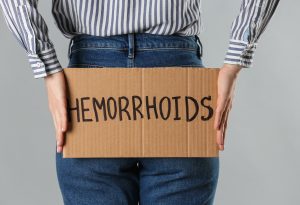Everything You Need to Know About Hemorrhoids

Fact: Everyone has hemorrhoids.
You were born with them, and you’ll die with them, and we all just hope they won’t cause too much trouble along the way!
In fact, hemorrhoids are a normal part of our anatomy, and only become an issue if they are symptomatic.
But what are hemorrhoids exactly?
Simply put, hemorrhoids are veins around the anus or lower rectum that have become swollen and inflamed.
Hemorrhoids are common in both men and women and about half of all people will have an issue with them by the time they turn 50. Risk factors include frequent straining to have a bowel movement, pregnancy, obesity, aging, and chronic constipation or diarrhea.
Hemorrhoids can happen either inside the anus (internal hemorrhoids) or under the skin around the anus (external hemorrhoids).
External hemorrhoids are dilated veins covered by the skin near the anal opening. They may be felt as bumps or lumps near the outside of the anus, and become painful when they are swollen with blood.
Internal hemorrhoids are dilated veins that form inside the rectum and above the anal opening. However, in some situations they may enlarge and protrude out of the anus.
Symptoms of hemorrhoids
Both external and internal hemorrhoids may have no symptoms. But if they do, typical things to watch for include:
- Bright red blood covering the stool, on toilet paper, or in the toilet bowl
- Itching
- Pain and discomfort
Additionally, external hemorrhoids may also produce a hard, painful lump that is a result of blood pooling or clotting under the skin.
What is the treatment for hemorrhoids?
There are a variety of treatment options for hemorrhoids, such as a warm bath and use of a cream or other medicines. Patients with large hemorrhoids or ones that have not responded to other treatments may need banding or surgery.
Even if you choose to treat hemorrhoids at home, you should see us if there is any rectal bleeding to rule out a more serious condition like colorectal cancer.
Preventing hemorrhoids
There are a few ways to easily manage the symptoms of troublesome hemorrhoids:
- Making sure you have regular, healthy stools. Stools that can pass easily decrease pressure and straining, which are both risk factors for hemorrhoids.
- Increasing dietary fiber intake and drinking plenty of water.
- Emptying your bowels soon after the urge to go occurs.
- Not sitting on the toilet for more than 15 minutes, as this causes blood to pool down in those veins.
- Adding exercise to your routine and walking regularly.
Contact us
If hemorrhoids are causing issues in your daily life, it may be time to visit us a seek treatment options.
Life is too short to feel miserable! Call Gastrointestinal Specialists, P.C. in Troy, Michigan at (248) 273-9930 or request an appointment here.
